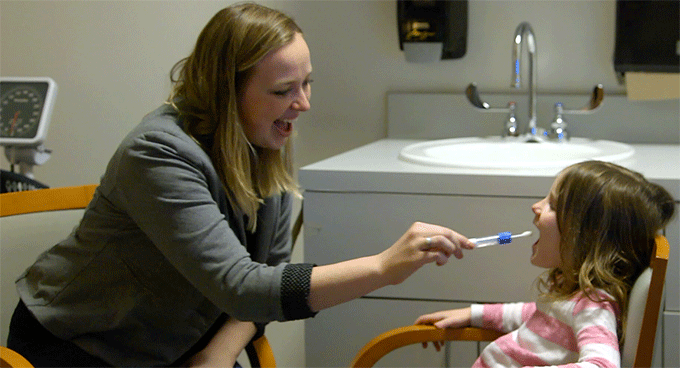New research suggests that changes in bacteria within a child’s mouth could help to identify autism.
The findings are likely to lead to the development of a saliva-based test to aid clinicians in early autism diagnosis.
Scientists from three organisations in the US collaborated in the research. They were Penn State Medical Center in Pennsylvania, SUNY Upstate Medical University in New York, and Quadrant Biosciences, also in New York.

Open wide: a researcher takes a mouth swab from a child during the study
Bacteria in the gut
Previous research has suggested that bacteria living in the gastrointestinal (GI) tract may influence autistic behaviour.
The research team pointed out that existing research had also associated autism with several abnormalities related to the mouth and throat. These include taste and texture aversions, speech difficulties and alterations in saliva.
Steve Hicks, assistant professor of pediatrics at Penn State Hershey Medical Center, was the lead investigator. He said: “There is mounting evidence that the GI microbiome is disrupted in children with ASD, and this study shows that this disruption may extend to the mouth and throat.
“It appears that gene expression activity within oral microbial communities is altered in children with autism spectrum disorder.”
He added: “The shifts in microbial populations were associated with ASD co-morbidities such as GI disturbances, as well as social and repetitive behaviours.”
Objective biomarkers
In Hicks’s view, this research suggests that measuring activity of these populations of bacteria in saliva may provide objective biomarkers to aid in the clinical evaluation of ASD.
In this study, researchers identified changes in the salivary microbiome of 346 children from the ages of two to six. They divided the children across three developmental profiles – those with ASD; those with non-autistic developmental delay; and typically developing children.
The researchers collected saliva via a cheek swab from each study participant. They sequenced, quantified and analyzed RNA from actively transcribing microbes across the three groups of children.
The team found 12 groups of microbes that were different in the three groups of children. They also identified 28 groups that distinguished ASD patients with and without GI disturbances.
The researchers published their study, ‘Oral Microbe Activity in Autism’, online in the journal Autism Research.
Related:
- Study seeks proof of gut link to autism
- Stress ‘likely cause of gut issues’
- Evidence grows for autism link to gut
- Study finds faecal transplants effective
- Parents right about GFCF diet
Published: 17 August 2018















